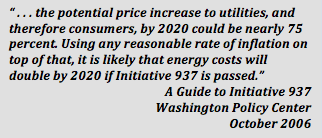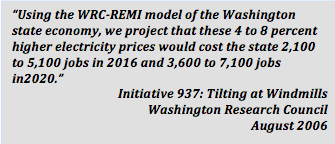I-937: The only thing we had to fear was fear itself
The first in a series celebrating the passage of Initiative 937 and its many benefits for Washington

The warn
We were warned that state utilities would be unable to meet I-937’s mandate that they produce 15% of electricity from new eligible renewable resources. They would be forced to choose between paying hundreds of millions of dollars in fines or sourcing renewably generated electricity on the open market where Washington would be vulnerable to volatile comodity prices.

These dire predictions were largely based on a Washington Research Council brief titled, “Initiative 937: Tilting Towards Windmills”, which predicted that the initiative’s passage would cause utility rates to increase by between 4% and 8% costing Washington customers between $185 million and $370 million annually.

Washington utility prices rose so modestly that the state, which had the nation’s seventh lowest average retail electric price at the time I-937 was passed, soon became #1 in the competition for lowest price. And, in 2013, a study commissioned by the state and conducted by the independent consulting firm, Leidos, determined that of all federal and state policies, I-937 was making the single greatest contribution to the reduction of greenhouse gases and that it would continue to be a major contributor through the end of the study period in 2050.

Evaluation of Approaches to Reduce Greenhouse Gas Emissions in Washington State – Final Report October 14, 2013
Why were the Research Council and other I-937 opponents so badly mistaken in their predictions? First, they vastly underestimated the volume of new eligible renewable energy that would soon be available as well as a corresponding plunge in costs. Just as importantly, they failed to account for gains in energy efficiency, which slowed growth in electricity demand.
As a result Washington achieved the least expensive electricity in America, cleaner air and water, and a significant reduction in emissions of greenhouse gasses that drive climate change.
In the next installment, we’ll recall the campaign to pass I-937.

